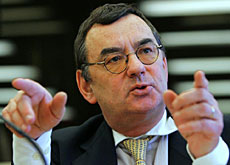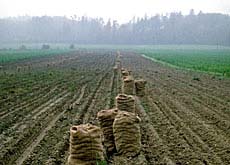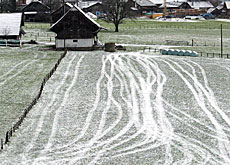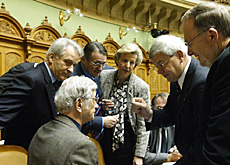Swiss reject WTO criticism of farm subsidies

Switzerland’s ambassador to the World Trade Organization (WTO) has defended the country’s agricultural policy against criticism that it is overly protectionist.
In an interview with swissinfo, Luzius Wasescha said the criticism was “unjustified” and that 2005 would be a “make or break year” for global trade talks.
The WTO wrapped up its regular review of Swiss trade policy this week, saying that the country’s level of subsidies for farming had not changed in four years (see related story).
But according to Wasescha, the country is on the “right track” towards phasing out financial support for its agricultural sector.
swissinfo: The WTO’s report card for Switzerland was quite negative. What is your response to their review?
Luzius Wasescha: I don’t think that this criticism was justified. I understand why the negative aspects of our agricultural policy have been highlighted. Given Switzerland’s very high level of prices, our support for agriculture is among the highest in the world. This raises concerns in an organisation where the objective is to liberalise progressively.
But we’re reducing our market support at a pace that is ten years ahead of what the European Union is doing – and what they’re doing is very impressive.
swissinfo: The report criticised Switzerland for being heavily dependent on external trade, saying that the main thrust for change must come from the bilateral agreements with the EU. What’s your response?
L.W.: The reality is more nuanced than that. Certainly, the EU is our main trading partner and we are an island in the middle of a sea called the European Commission.
Therefore, we focus on those relationships. But we will not neglect our relationships outside Europe.
For example, we are in talks with the United States about modernising our economic relationship and we are investigating with Japan whether it is feasible to create free-trade agreements.
swissinfo: So fears that the bilateral agreements are creating a trade bias and pushing Switzerland in a Eurocentric direction are unfounded?
L.W.: They are largely unfounded, yes. Geographically, there is no doubt that we are in Europe. But politically and economically, there are no borders.
swissinfo: Swiss farmers are already having a tough time, with 30 per cent of farms having been forced to close between 1990 and 2003. Is it possible for the government to live up to its WTO promises while trying to help Swiss farmers survive?
L.W.: We have to implement a policy that is realistic.
The farmers say the transition is taking place too fast and the WTO says we’re moving too slowly. I would say that this is evidence of a good policy and that we’re on the right track, because the reforms are taking place [somewhere in between these two extremes].
swissinfo: Do you think too much weight is given to agriculture during WTO talks and review processes such as the one Switzerland has just gone through?
L.W.: I understand the focus on agriculture, but we risk becoming a “World Agricultural Organization” and that’s very bad, because challenges for international trade don’t just lie there.
For example, 10.2 per cent of the world market is made up of the trade in counterfeited goods, while agricultural goods represent just 8.5 per cent.
Other issues such as anti-dumping, trade in security, as well as trade and competition are elements that should be better addressed at the WTO.
swissinfo: The EU’s new agriculture chief, Mariann Fischer Boel, believes WTO members should be able to reach a binding accord to liberalise global commerce in 2006. Are you equally optimistic?
L.W.: It’s an ambitious objective and it will be very positive if we manage to do so, because we would like to see an end to this round of talks under the current US trade administration.
We have a window of opportunity to conclude this round by 2006 and we have to seize it. So to a certain extent, 2005 is going to be a ‘make or break’ year for the WTO.
swissinfo: Speaking of next year, the race is already heating up to determine who will replace current WTO Director-General Supachai Panitchpakdi, when his term ends in September. Who is Switzerland backing as a candidate?
L.W.: We’re waiting for the candidate submission deadline to pass at the end of the month. After that, we’ll evaluate all of the candidates and develop our position at the beginning of February.
swissinfo: Might Switzerland put forward its own candidate?
L.W.: I’m not ruling anything out.
swissinfo-interview: Anna Nelson in Geneva
Switzerland’s ambassador to the WTO, Luzius Wasescha, has rejected criticism that the country is moving too slowly towards reducing agricultural subsidies.
In a report issued this week, the world trade body said Switzerland’s financial support for farming had not changed since 2000, the date of the WTO’s last policy review of the country.
Wasescha called the criticism unjustified, adding that the WTO faced huge challenges next year in wrapping up talks aimed at lowering barriers to commerce.

In compliance with the JTI standards
More: SWI swissinfo.ch certified by the Journalism Trust Initiative



You can find an overview of ongoing debates with our journalists here. Please join us!
If you want to start a conversation about a topic raised in this article or want to report factual errors, email us at english@swissinfo.ch.